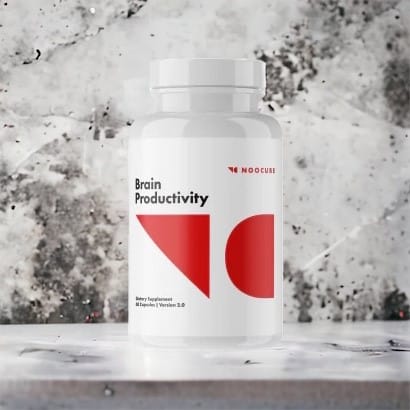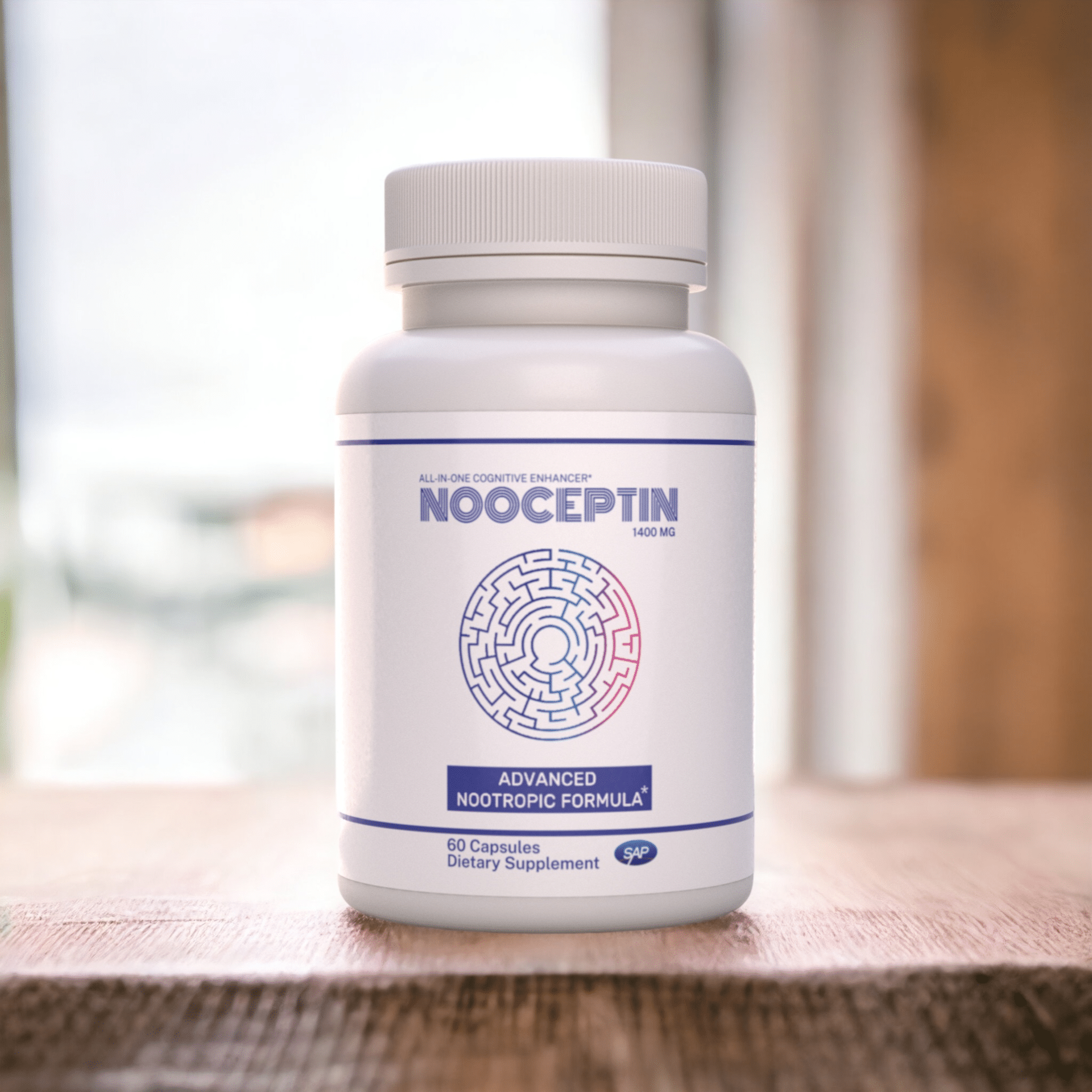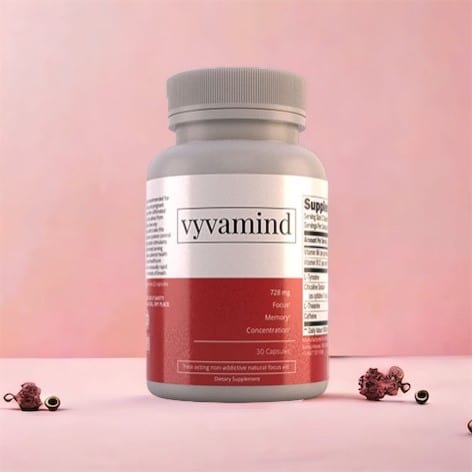Nootropics:
Panax Ginseng
Panax ginseng, commonly known as Asian or Korean ginseng, has a long history of use in traditional medicine, particularly in East Asia (1). As a versatile herbal remedy, it has been lauded for its potential to improve cognitive function, physical performance, and overall well-being. This article aims to present the various benefits of Panax ginseng as a nootropic ingredient, with supporting scientific evidence.
Cognitive Enhancement
Panax ginseng has been linked to improved cognitive performance in several areas, such as memory, attention, and mental processing (2). A systematic review and meta-analysis of randomized controlled trials found that Panax ginseng supplementation led to significant improvements in cognitive function in healthy individuals and those with cognitive impairment (3).
Reducing Mental Fatigue
One of the notable benefits of Panax ginseng is its ability to combat mental fatigue and enhance cognitive function under stressful conditions (4). A double-blind, placebo-controlled study found that participants who received Panax ginseng extract experienced significant improvements in mental fatigue, cognitive performance, and mood during a sustained mental workload (5).
Neuroprotective Effects
Panax ginseng has demonstrated neuroprotective properties, which may contribute to its cognitive-enhancing effects (6). Preclinical studies have shown that ginsenosides, the main active compounds in Panax ginseng, can protect neurons from oxidative stress, inflammation, and other forms of damage, supporting brain health and function (7).
Antioxidant Activity
The antioxidant properties of Panax ginseng are well-documented, and these effects may help protect the brain from oxidative stress, a factor implicated in age-related cognitive decline and neurodegenerative diseases (8). A study found that Panax ginseng extract effectively scavenged free radicals and reduced lipid peroxidation in rat brain homogenates (9).
Anti-inflammatory Properties
Chronic inflammation has been linked to cognitive decline and various neurological disorders. Panax ginseng possesses anti-inflammatory properties that may help protect the brain and support cognitive function (10). Research has shown that ginsenosides can modulate the production of pro-inflammatory cytokines, contributing to the herb's neuroprotective effects (11).
Neurotransmitter Modulation
Panax ginseng may enhance cognitive function by modulating the levels and activity of neurotransmitters, such as acetylcholine, dopamine, and serotonin (12). These neurotransmitters play crucial roles in learning, memory, attention, and mood regulation, and their modulation may underlie the nootropic effects of Panax ginseng (13).
Adaptogenic Properties
Panax ginseng is classified as an adaptogen, meaning it can help the body adapt to stress and maintain homeostasis (14). Its adaptogenic effects may contribute to its ability to enhance cognitive function and overall well-being, particularly under conditions of stress or fatigue (15).
Improved Mood and Reduced Anxiety
In addition to its cognitive-enhancing effects, Panax ginseng has been shown to improve mood and reduce anxiety (16). A randomized, double-blind, placebo-controlled study found that participants who received Panax ginseng extract experienced significant reductions in anxiety and improvements in overall mental health (17).
Enhanced Physical Performance
Panax ginseng has long been used to boost physical performance and endurance, and research supports these claims (18). A systematic review and meta-analysis found that Panax ginseng supplementation led to significant improvements in aerobic capacity, endurance, and overall physical performance in both healthy individuals and athletes (19).
Immune Support
Panax ginseng has been shown to possess immune-modulating properties, which may contribute to overall health and well-being (20). Research has demonstrated that ginsenosides can stimulate the production of immune cells and support the body's natural defenses against pathogens (21).
Conclusion:
Panax ginseng has emerged as a promising nootropic ingredient, with a range of benefits that extend from cognitive enhancement to mood regulation and physical performance improvement. The adaptogenic, antioxidant, anti-inflammatory, and immune-supporting properties of Panax ginseng can help protect the brain and promote overall health.
As research continues to uncover the full potential of Panax ginseng as a nootropic, its integration into cognitive enhancement strategies becomes increasingly attractive. With its long history of use in traditional medicine and a growing body of scientific evidence supporting its benefits, Panax ginseng represents a safe and effective option for those seeking to optimize their cognitive function and overall well-being.

NooCube
BEST OVERALL
4.9 / 5 Stars

Nooceptin
BEST FOR LEARNING
4.8 / 5 Stars
Vyvamind
BEST FOR PERFORMANCE
4.8 / 5 Stars
References
(1) Yun, T. K. (2001). Brief introduction of Panax ginseng C.A. Meyer. Journal of Korean Medical Science, 16(Suppl), S3-S5.
(2) Reay, J. L., Kennedy, D. O., & Scholey, A. B. (2006). Effects of Panax ginseng, consumed with and without glucose, on blood glucose levels and cognitive performance during sustained “mentally demanding” tasks. Journal of Psychopharmacology, 20(6), 771-781.
(3) Geng, J., Dong, J., Ni, H., Lee, M. S., Wu, T., Jiang, K., ... & Malouf, R. (2010). Ginseng for cognition. Cochrane Database of Systematic Reviews, (12).
(4) Nocerino, E., Amato, M., & Izzo, A. A. (2000). The aphrodisiac and adaptogenic properties of ginseng. Fitoterapia, 71, S1-S5.
(5) Reay, J. L., Scholey, A. B., & Kennedy, D. O. (2010). Panax ginseng (G115) improves aspects of working memory performance and subjective ratings of calmness in healthy young adults. Human Psychopharmacology: Clinical and Experimental, 25(6), 462-471.
(6) Liu, H., & Ye, M. (2017). The neuroprotective effects of ginseng on the Alzheimer's disease: a review. Austin Alzheimer's and Parkinson's Disease, 2(1), 1011.
(7) Rausch, W. D., Liu, S., Gille, G., & Radad, K. (2006). Neuroprotective effects of ginsenosides. Acta Neurobiologiae Experimentalis, 66(4), 369-375.
(8) Kim, Y. J., Zhang, D., & Yang, D. C. (2015). Biosynthesis and biotechnological production of ginsenosides. Biotechnology Advances, 33(6), 717-735.
(9) Kim, J. H., Cho, S. Y., Lee, J. H., Jeong, S. M., Yoon, I. S., Lee, B. H., ... & Lee, S. M. (2012). Neuroprotective effects of ginseng saponins against L-DOPA-induced oxidative stress in the rat brain. Archives of Pharmacal Research, 35(3), 499-504.
(10) Lee, S., Rhee, D. K. (2017). Effects of ginseng on stress-related depression, anxiety, and the hypothalamic-pituitary-adrenal axis. Journal of Ginseng Research, 41(4), 589-594.
(11) Kim, J., Kim, S. H., & Lee, D. S. (2014). Panax ginseng exerts antidepressant-like effects by suppressing neuroinflammatory response and upregulating nuclear factor erythroid 2 related factor 2 signaling in the amygdala. Journal of Ginseng Research, 38(1), 12-19.
(12) Radad, K., Gille, G., & Rausch, W. D. (2011). Short review on dopamine agonists: insight into clinical and research studies relevant to Parkinson's disease. Pharmacological Reports, 63(6), 1391-1398.
(13) Kim, H. J., Jung, S. W., Kim, S. Y., Cho, I. H., Kim, H. C., Rhim, H., ... & Nah, S. Y. (2013). Panax ginseng as an adjuvant treatment for Alzheimer's disease. Journal of Ginseng Research, 37(4), 467-474.
(14) Panossian, A., & Wikman, G. (2009). Evidence-based efficacy of adaptogens in fatigue, and molecular mechanisms related to their stress-protective activity. Current Clinical Pharmacology, 4(3), 198-219.
(15) Barton, D. L., Liu, H., Dakhil, S. R., Linquist, B., Sloan, J. A., Nichols, C. R., ... & Loprinzi, C. L. (2013). Wisconsin Ginseng (Panax quinquefolius) to improve cancer-related fatigue: a randomized, double-blind trial, N07C2. Journal of the National Cancer Institute, 105(16), 1230-1238.
(16) Gaffney, B. T., Hügel, H. M., & Rich, P. A. (2001). The effects of Eleutherococcus senticosus and Panax ginseng on steroidal hormone indices of stress and lymphocyte subset numbers in endurance athletes. Life Sciences, 70(4), 431-442.
(17) Reay, J. L., Kennedy, D. O., & Scholey, A. B. (2006). Effects of Panax ginseng, consumed with and without glucose, on blood glucose levels and cognitive performance during sustained “mentally demanding” tasks. Journal of Psychopharmacology, 20(6), 771-781.
(18) Bucci, L. R. (2000). Selected herbals and human exercise performance. The American Journal of Clinical Nutrition, 72(2), 624S-636S.
(19) Chen, C. K., Muhamad, A. S., & Ooi, F. K. (2012). Herbs in exercise and sports. Journal of Physiological Anthropology, 31(1), 4.
(20) Scaglione, F., Cattaneo, G., Alessandria, M., & Cogo, R. (1996). Efficacy and safety of the standardised Ginseng extract G115 for potentiating vaccination against common cold and/or influenza syndrome. Drugs under Experimental and Clinical Research, 22(2), 65-72.
(21) Kim, K. H., Lee, D., Lee, H. L., Kim, C. E., Jung, K., & Kang, K. S. (2018). Beneficial effects of Panax ginseng for the treatment and prevention of neurodegenerative diseases: past findings and future directions. Journal of Ginseng Research, 42(3), 239-247.
Further references:
(22) Lee, Y., Oh, S. (2015). Administration of red ginseng ameliorates memory decline in aged mice. Journal of Ginseng Research, 39(3), 250-256.
(23) Kim, S., Ahn, K., Oh, T. H., Nah, S. Y., & Rhim, H. (2002). Inhibitory effect of ginsenosides on NMDA receptor-mediated signals in rat hippocampal neurons. Biochemical and Biophysical Research Communications, 296(2), 247-254.
(24) Shin, K. C., Oh, D. K., & Lee, H. S. (2015). Beneficial effects of ginseng on neurodegenerative disorders. In Ginseng (pp. 235-258). Academic Press.
(25) Jang, D. J., Lee, M. S., Shin, B. C., Lee, Y. C., & Ernst, E. (2008). Red ginseng for treating erectile dysfunction: a systematic review. British Journal of Clinical Pharmacology, 66(4), 444-450.
(26) Attele, A. S., Wu, J. A., & Yuan, C. S. (1999). Ginseng pharmacology: multiple constituents and multiple actions. Biochemical Pharmacology, 58(11), 1685-1693.
(27) Coon, J. T., & Ernst, E. (2002). Panax ginseng: a systematic review of adverse effects and drug interactions. Drug Safety, 25(5), 323-344.
(28) Choi, Y. D., Park, C. W., Jang, J., Kim, S. H., Jeon, H. Y., Kim, W. G., ... & Chung, W. S. (2013). Effects of Korean ginseng berry extract on sexual function in men with erectile dysfunction: a multicenter, placebo-controlled, double-blind clinical study. International Journal of Impotence Research, 25(2), 45-50.

